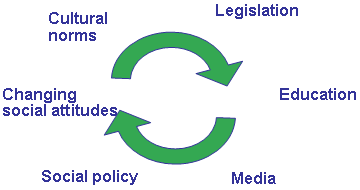What Equality Means In Britain Today
Ipsos conducted 8 focus groups on behalf of the Equalities Review looking at perceptions of equality. People have a clear and shared understanding of what equality means. They understand it is not about just being treated the same, but rather it is about being given the same opportunities. This means that individual differences and needs must be taken into account (for example relating to religious needs and the needs of the disabled) in order for everyone to have an 'equal chance'.
All groups recognise that there have been considerable improvements in equality (particularly in relation to ethnicity, gender and disability) which have been largely driven by education and changes in legislation and social attitudes.

However, all respondents recognise that there is still a long way to go in order for true equality to be achieved. Many note that more subtle forms of inequality now exist and many respondents feel it will be impossible to legislate against these, rather many feel that future improvements will need to be driven by changes in attitudes.
Areas identified as priorities for future policy focus include age, religious and ethnic inequalities, particularly in the spheres of education and employment and to a lesser extent health and social welfare.
![]() Download the presentation pdf, 151KB
Download the presentation pdf, 151KB
Technical details
Eight focus groups were conducted between 28 February and 8 March 2006 across four UK locations (Birmingham, Bradford, London and rural Scotland). Four groups were comprised of respondents aged 18-35, and four were comprised of those aged 35+; five groups were with respondents from social class C2DE and three were with those from social class ABC1. Three groups were comprised of white respondents, three with Asian respondents (one Bangladeshi Muslim, one Pakistani Muslim and one Hindu/Sikh group), and two with black respondents.



